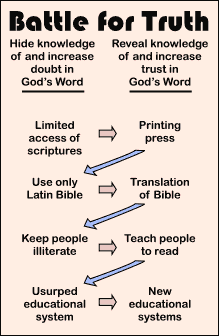
The Origin of the Bible
Why is it so important that we know the Bible is reliable?
The Bible's Challenge | Transformation | Canonization| Extent | Inspiration | Reliability | Relevance | VersionWhat we believe about the origins of the Bible largely shape our eagerness to learn and study His Word. Our faith in God is dependent upon our trust in God and His Son Christ. This belief is largely dependent on our confidence that the Bible is God's Word.
"So faith comes from hearing, and hearing by the word of Christ" (Romans 10:17).
The devil’s success is dependent on how much he can keep people from knowing and trusting God’s Word. He therefore tries to undermine the knowledge and reliability of the scriptures. For the first 1500 years after Christ, scriptures were not common.
The scriptures were handwritten largely in scrolls and reading was for society’s elitist class. The evil one could easily distort what God had said to someone, just as he did with Eve in the Garden of Eden.
With the coming of the printing press and the production of large quantities of Bibles at cheaper prices, the evil one had difficulty holding back God's truth to His people. He managed for a while, however, by causing the church to insist on only using the Latin translation of the Bible (Vulgate). Again, only those highly educated could read Latin.
This only lasted for a short period because God rose up bold translators that were willing to die to bring God’s Word to the people in their own languages.
Satan again had to change tactics. He resorted to keeping as many people as possible back from learning how to read. God burdened Christians, however, to reach out to everybody by educating the masses. This was the origin of the Sunday School movement. They would teach everyone how to read so that they could read the Bible. The devil loss control again.
He decided he would thwart this whole process. He would, however, allow everyone to be educated. Satan would popularize education and take control of it. We see today that the evil one keeps God's word out of education, lessens its impact with a slew of other books and undermines the authority of God's Word.
Meanwhile, the Lord has risen up more Christian schools, the home school movement and new educational systems. This last aspect is what we are focusing on in this article.
Since the evil one has dominated the modern educational and media outlets, he uses these means to keep people away from God's Word and to undermine the reliability or trustworthiness of God's Word. This last aspect is our focus in these articles. He creates doubt in God's Word chiefly by two means.
(1) Lack of information. Very few Christians know about the origin of the Bible.
(2) Misinformation. When the facts are not known, then it is easy to belief a lie.
This is the situation today. Christians hear all sorts of things about the Bible. They might hear of other scriptures such as Gnostic writings. Or they might read a news clip about the Jesus Seminar which asserts that very little of the gospels is reliable.
They have nowhere to easily discover out the facts. As a result Christians end up hiding their powerful sword to fight off the enemy. They doubt God’s Word really works. What do you believe about the origin and reliability of God’s Word?
If I don't believe God's Word is really trustworthy, ... will I really commit myself to daily read and meditate on His Word?
|
Personal testimony
I have studied the many attacks made on the reliability of the scriptures. Each time I plod through all the facts about the Bible's origin and its reliability, I come back to a stronger trust in the Word of God than before.
The attacks might have become more loud and media-hyped in recent years but their arguments have less and less support. The advances in languages, archaeology, knowledge and biblical studies have more and more confirmed their reliability. The scriptures as we know them are the Word of God.
God has chosen to speak to us and the welfare and success of our lives and churches depend upon the degree we belief and follow God's Word.
"For whatever is born of God overcomes the world;
and this is the victory that has overcome the world - our faith" (1 John 5:4).
Knowing about God's Word and its reliability is one important matter, but one also needs to know how to meet God in the scriptures.
Other Articles on the Origin of the Bible Series |
|
1. How is the Bible different today from before? |
|
2. How did the Bible come into being? |
|
3. Why aren't other books part of the Bible? |
|
4. How is the Bible different from other books? |
|
5. Doesn't the Bible have a lot of mistakes? |
|
6. Is the Bible really relevant to my life? |
|
7. What Bible version should I use? I'm confused. |
|
8. Why do some people say that I must use the KJV? |
|
info@foundationsforfreedom.net
Scriptures typically quoted from the New American Standard Bible unless noted:
(C) Copyright The Lockman Foundation 1988











